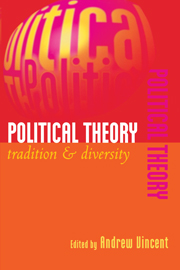Book contents
- Frontmatter
- Contents
- Preface
- List of Contributors
- Introduction
- 1 Political Theory and Conceptual Change
- 2 Political Theory and the Problem of Anachronism
- 3 Utilitarianism as a Public Philosophy
- 4 Rational Choice Political Theory
- 5 Republican Political Theory
- 6 Liberalism, Multiculturalism and Oppression
- 7 Postcolonialism and Political Theory
- 8 Legal Positivism and Political Power
- 9 Political Theory, International Theory, and the Political Theory of International Relations
- 10 Method Matters: Feminism, Interpretation and Politics
- 11 The Political Philosophy of Deleuze and Guattari
- 12 The Object of Political Theory
- Index
9 - Political Theory, International Theory, and the Political Theory of International Relations
Published online by Cambridge University Press: 29 March 2011
- Frontmatter
- Contents
- Preface
- List of Contributors
- Introduction
- 1 Political Theory and Conceptual Change
- 2 Political Theory and the Problem of Anachronism
- 3 Utilitarianism as a Public Philosophy
- 4 Rational Choice Political Theory
- 5 Republican Political Theory
- 6 Liberalism, Multiculturalism and Oppression
- 7 Postcolonialism and Political Theory
- 8 Legal Positivism and Political Power
- 9 Political Theory, International Theory, and the Political Theory of International Relations
- 10 Method Matters: Feminism, Interpretation and Politics
- 11 The Political Philosophy of Deleuze and Guattari
- 12 The Object of Political Theory
- Index
Summary
Theories of international relations, in both their behaviouralist and anti-behaviouralist forms – that dominated the sub-discipline for sixty years or so – self-consciously rejected political theory in an attempt to establish their own intellectual credentials. Although subject to similar pressures, international theory rejected the option taken by political theory of defining itself in terms of its illustrious past, and missed the opportunity of firmly anchoring itself on sound philosophical foundations. Paradoxically, the ‘English School’, represented by Wight and Bull, far from strengthening the intellectual heritage, undermined it: they failed to employ discriminating criteria to differentiate genuinely philosophical contributions from the merely polemical. The emphasis upon taxonomy averted the gaze from the quality of argument. However, political theory and international relations theory become genuinely united in focusing upon the issue of identity, that is, the answers to the question ‘Who am I?’ The consequent politics of recognition, inclusion and exclusion bring into focus not only the politics of the nation, state and cosmopolitanism, but also of gender, race, religion and ethnicity. All these forms of identity are answers to the question ‘Who am I?’, and all are integral to a multidimensional approach to the political theory of international relations. I conclude by suggesting that much of the newly generated normative political theory of international relations, from whatever intellectual perspective, is directly addressing the key question long ago identified by T. H. Green, and that is the ethical status of one's community and how to extend it to become more and more inclusive of a wider range of people we are prepared to regard as our neighbours.
- Type
- Chapter
- Information
- Political TheoryTradition and Diversity, pp. 193 - 213Publisher: Cambridge University PressPrint publication year: 1997
- 9
- Cited by



